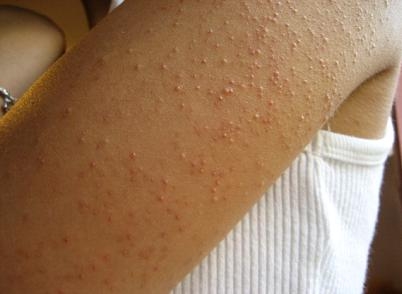Keratosis Pilaris Symptoms, Causes, Diagnosis and Treatment

What Is Keratosis Pilaris?
Keratosis Pilaris is a condition in which hard bumps are created usually on the buttocks, upper arms and thighs. These bumps are either white and dry or red and swollen. Fortunately, Keratosis Pilaris rarely occurs on face and is not harmful. Despite rare itching, a victim does not feel any pain whilst, the condition hardly turns severe. Researchers and medical studies have proved that as the victim grows older, the bumps start to disappear.
What Causes Keratosis Pilaris?
The theory that seems to be authentic to an extent states that when too much keratin, protein that helps prevent infection and other harm to our skin, gathers on the opening of a hair follicle, keratosis pilaris occurs. However, the reason of why this protein gathers up is still unknown. On the other hand, experts claim that people with dry skin are more likely to suffer from this condition, especially in winter when there is a lack of moisture in the environment.
What Are The Symptoms Of Keratosis Pilaris?
The symptoms of Keratosis Pilaris are pretty obvious, which includes:
- Minor bumps that are either white or red.
- Bumps worsen during winter due to dryness and lack of moisture.
- Roughness and, at times, itchiness on the area of bumps.
In extreme and rare cases, bumps may get inflamed and leave scars especially on face.
What Are The Risk Factors Of Keratosis Pilaris?
The risk of having this condition is greater if a person:
- Is less than ten years of age.
- Is a female.
- Genetically receives the condition from forefathers.
The risk factors of the condition worsening include pregnancy and puberty.
How Is Keratosis Pilaris Diagnosed?
There are no specific tests that can help diagnose Keratosis Pilaris. Medical researchers claim that doctors can easily diagnose Keratosis Pilaris through physical examination of the affected skin and a detailed discussion with the victim. This is because the symptoms of the condition are clearly obvious. However, a discussion with the victim is important to eliminate any possible doubts.
How Is Keratosis Pilaris Treated?
Unfortunately, there is no cure for this condition. According to the researchers, keratosis pilaris disappear as the victim grows older. However, the bumps can become soft if the victim constantly uses a moisturizer. Certain medications may also help to reduce itchiness, if any, however one must always ask the doctor or dermatologist to prescribe one for her or him.
How Can Keratosis Pilaris Be Prevented?
Just as there is no way to cure Keratosis Pilaris, it is nearly impossible to prevent it from happening. Researchers have failed to understand why keratin gathers in one place and blocks the opening of hair follicle. However, experts suggest people to keep their skin healthy by:
- Using moisturizers.
- Pat drying body.
- Using humidifier.
- Avoiding soaps that cause dryness.
These measures will keep your skin healthy and the probability of Keratosis Pilaris reduced.
Related Articles :
Ecthyma Symptoms, Causes, Diagnosis and Treatment
Diaper Dermatitis Symptoms, Causes, Diagnosis and Treatment
Chronic Lymphocytic Leukemia Symptoms, Causes, Diagnosis and Treatment
Bartonellosis Symptoms, Causes, Diagnosis and Treatment
Pruritus Symptoms, Causes, Diagnosis and Treatment
Measles Symptoms, Causes, Diagnosis and Treatment
Impetigo Symptoms, Causes, Diagnosis and Treatment
Idiopathic Thrombocytopenic Purpura Symptoms, Causes, Diagnosis and Treatment
Ichthyosis Vulgaris Symptoms, Causes, Diagnosis and Treatment
Seborrheic Keratosis Symptoms, Causes, Diagnosis and Treatment
Scleroderma Symptoms, Causes, Diagnosis and Treatment
Porphyria Symptoms, Causes, Diagnosis and Treatment
Polycythemia Vera Symptoms, Causes, Diagnosis and Treatment
Hidradenitis Suppurativa Symptoms, Causes, Diagnosis and Treatment
Hyperhidrosis Symptoms, Causes, Diagnosis and Treatment
Lichen Planus Symptoms, Causes, Diagnosis and Treatment
By : Natural Health News




